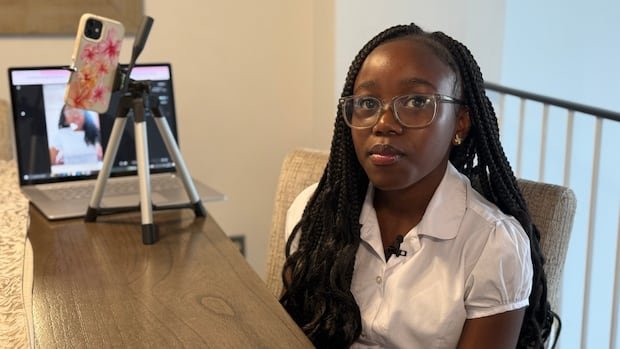Chloe Kizito observes a constant stream of videos spreading misinformation related to health and science whenever she browses through her social media accounts. Kizito, a 16-year-old fact checker and youth journalist at MediaSmarts, creates videos to educate teenagers on how to assess the credibility of online content.
She frequently encounters videos making dubious claims like, “This remedy can cure that ailment,” or “Engaging in this activity will lead to a particular disease or health issue,” said Kizito, who resides in Kitchener, Ontario.
Reflecting on the past year, Kizito noted an increase in health misinformation, attributing it to the rise of deepfakes and AI on social media platforms. These deceptive videos often manipulate the likeness of renowned individuals to create content that falsely portrays celebrities or politicians endorsing certain statements.
In response to the escalating spread of false health information, the Canadian Medical Association, along with regional medical associations and experts, issued a plea for enhanced efforts from governments, healthcare providers, and educators to combat the prevalence of misleading health content influencing public perceptions and policy decisions.
A critical concern raised by Canadian physicians is the reluctance of some patients to accept proven treatments due to misinformation, resulting in severe consequences, including fatalities.
Tim Caulfield, a law professor at the University of Alberta’s School of Public Health and a signatory to the CMA’s declaration, emphasized the significant role played by social media influencers and podcasters in disseminating health misinformation in recent years. Caulfield highlighted the politicization of health topics, making it challenging to alter individuals’ beliefs once these issues become intertwined with their identities.
While some may view the notion of misinformation causing fatalities as exaggerated, Caulfield underscored the dire consequences, such as increased vaccine hesitancy leading to preventable deaths from diseases like measles. He also highlighted the financial exploitation resulting from unproven supplements, leading individuals to waste money on ineffective treatments.
Dr. Joseph Dahine, an intensive care physician in Laval, Quebec, utilizes platforms like TikTok to combat misinformation surrounding COVID-19 and other health conditions. Dahine recounted a tragic incident involving a COVID-19 patient in 2021 who refused to believe in the existence of the virus, ultimately succumbing to the illness despite medical intervention.
Dahine emphasized the detrimental impact of misinformation, citing cases where individuals pursued ineffective natural remedies for cancer or ignored symptoms of metastatic breast cancer until the condition became incurable.
In alignment with the CMA’s stance, Dr. Margot Burnell, the association’s president and an oncologist, proposed two solutions to address the issue. Firstly, she advocated for improved access to primary care through increased availability of family physicians and nurse practitioners to ensure individuals receive medical advice from qualified professionals. Secondly, Burnell emphasized the importance of presenting patients with factual information about their treatments with empathy and clarity to empower them in making informed decisions.
Dr. Dahine echoed the call for better access to healthcare providers, cautioning against relying solely on online sources for medical guidance, especially during urgent situations. He stressed the significance of seeking assistance from qualified professionals rather than turning to search engines or social media platforms for healthcare advice.
Contrary to prevalent misinformation, the CMA’s statement reaffirmed the scientific consensus that vaccines do not cause or elevate the risk of autism, emphasized the ineffectiveness of ivermectin in treating COVID, cancer, or autism, and highlighted the safety and efficacy of COVID vaccines.
To combat misinformation effectively, Caulfield recommended educating the public about the types of misinformation they may encounter, actively debunking false claims, promoting critical thinking skills and media literacy, and emphasizing the importance of scientific consensus. He emphasized the need for individuals to pause and verify information before sharing it to mitigate the impact of misinformation in today’s polarized environment.
Kizito shared her approach to addressing misinformation within her social circle, encouraging a methodical process of verifying content by identifying the original source and cross-referencing information from reliable sources. MediaSmarts, a leading authority on digital media literacy in Canada, offers practical steps to identify and counter misinformation, including utilizing fact-checking tools, verifying original news sources, and assessing the credibility of information providers.
By fostering a culture of critical thinking and information verification, individuals can play a vital role in curbing the spread of health misinformation and safeguarding public health.

